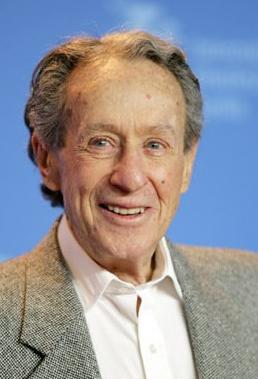Arthur Penn facts for kids
Quick facts for kids
Arthur Penn
|
|
|---|---|

Penn at the 2007 Berlin International Film Festival
|
|
| Born |
Arthur Hiller Penn
September 27, 1922 Philadelphia, Pennsylvania, U.S.
|
| Died | September 28, 2010 (aged 88) New York City, U.S.
|
| Occupation | Film director, producer |
| Spouse(s) |
Peggy Maurer
(m. 1955) |
| Children | 2, including Matthew |
| Family | Irving Penn (elder brother) |
Arthur Hiller Penn (September 27, 1922 – September 28, 2010) was an American director and producer. He worked on films, television shows, and theater plays. Penn was a key figure in the "American New Wave" film movement. This was a time when many new and exciting movies were made in the United States.
He directed many popular films in the 1960s. These included the drama The Chase (1966) and the crime film Bonnie and Clyde (1967). He also directed the comedy Alice's Restaurant (1969). Later, he made the Western movie Little Big Man (1970).
In the 1990s, Penn returned to directing and producing for stage and TV. He was an executive producer for the crime series Law & Order. By the time he passed away in 2010, he had earned many awards. These included nominations for three Academy Awards for Best Director. He also received an Honorary Golden Bear and a Tony Award.
Contents
Early Life
Arthur Penn was born in Philadelphia, Pennsylvania. His family was Russian Jewish. His mother, Sonia, was a nurse, and his father, Harry, was a watchmaker. Arthur was the younger brother of Irving Penn, a famous fashion photographer.
When he was young, Arthur lived with his mother after his parents divorced. Later, he moved back to help his sick father with his watch repair shop. At 19, he joined the United States Army during World War II (1943–1946). He fought as an infantry soldier in the Battle of the Bulge.
While in Britain, he became very interested in theater. He started directing and acting in shows for soldiers. As he grew up, he loved film more and more. He was especially inspired by Orson Welles's movie Citizen Kane.
Career Highlights
Arthur Penn first became known for directing good TV dramas. His first feature film was The Left Handed Gun (1958). This movie told the story of the famous outlaw Billy the Kid. Paul Newman played Billy the Kid as a troubled young man. The movie was filmed very quickly, but the studio changed the ending. It did not do well in North America but was liked in Europe.
Penn's second film was The Miracle Worker (1962). This movie showed how Anne Sullivan taught Helen Keller, who was blind and deaf, to communicate. The main actresses, Anne Bancroft and Patty Duke, both won Academy Awards for their roles. Penn had also directed the successful stage play of The Miracle Worker.
In 1965, Penn directed Mickey One. This film was influenced by the "French New Wave" style of filmmaking. It was a dream-like story about a comedian on the run. Penn later said the movie was about the fear people felt during a difficult time in history.
His next film was The Chase (1966). This was a thriller about an escaped prisoner returning to a corrupt town. The movie showed themes of racism and violence in American society. That same year, he directed the stage play Wait Until Dark.
Penn worked again with actor Warren Beatty on the gangster film Bonnie and Clyde (1967). This movie became a huge worldwide hit. It was also inspired by the French New Wave. Bonnie and Clyde greatly influenced many young filmmakers. Its success earned Penn a lot of money.
After Bonnie and Clyde, Penn heard a story about a big littering event. He decided to make a film based on Arlo Guthrie's song "Alice's Restaurant Massacree". The movie, Alice's Restaurant, came out in 1969. His next film was Little Big Man (1970). This movie told the story of a white man, played by Dustin Hoffman, adopted by the Cheyenne tribe.
In 1973, Penn contributed a part to a film about the Olympics called Visions of Eight. His next movie was Night Moves (1975). It was about a private detective, played by Gene Hackman, looking for a runaway. Then came The Missouri Breaks (1976). This film starred Jack Nicholson as a horse thief and Marlon Brando as a strange bounty hunter.
In the 1980s, Penn's films were not as popular with critics or audiences. These included Four Friends (1981), Target (1985), and Dead of Winter (1987). After this, Penn went back to working in television. He was an executive producer for the crime series Law & Order. He also taught classes at Yale University sometimes.
Personal Life
In 1955, Arthur Penn married actress Peggy Maurer. They had two children, a son named Matthew Penn and a daughter named Molly Penn.
Death
Arthur Penn passed away in Manhattan on September 28, 2010. He died from congestive heart failure, one day after his 88th birthday.
Work
Filmography
Stage
Television
See Also
|
 | Jackie Robinson |
 | Jack Johnson |
 | Althea Gibson |
 | Arthur Ashe |
 | Muhammad Ali |


 In Spanish:
In Spanish: